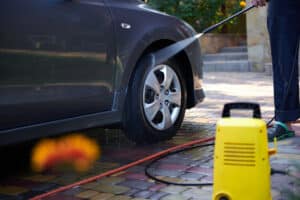Are Electric Pressure Washers Environmentally Friendly?
Key Takeaways
- Electric pressure washers have a smaller environmental impact overall compared to gas pressure washers.
- Electric pressure washers do not produce emissions or rely on fossil fuels for operation, making them more environmentally friendly.
- Electric pressure washers operate quietly and are often more energy-efficient than gas pressure washers.
Electric pressure washers have gained popularity in recent years as a cleaner and greener alternative to their gas-powered counterparts. These machines offer a range of benefits, including reduced carbon emissions, lower noise levels, and a smaller environmental impact overall. In this article, we will explore the environmental friendliness of electric pressure washers and compare them to gas pressure washers.
The Environmental Impact of Electric Pressure Washers
Electric pressure washers are considered to be eco-friendly as they run on clean electricity and do not produce emissions or rely on fossil fuels for operation. They draw power from the home power supply, which is typically generated by a mix of renewable and non-renewable sources. However, even if the electricity comes from non-renewable sources, electric pressure washers still have a lower carbon footprint compared to gas pressure washers.
One of the significant advantages of electric pressure washers is that they do not release harmful emissions into the atmosphere. Gas pressure washers, on the other hand, burn gasoline and emit pollutants that contribute to environmental pollution. These emissions can include carbon monoxide, nitrogen oxides, and volatile organic compounds (VOCs), which are known to have detrimental effects on air quality and human health.
In addition to emissions, gas pressure washers also rely on fossil fuels, which are non-renewable resources. Extracting and burning these fuels contribute to climate change and other environmental issues. On the contrary, electric pressure washers use electricity, which can be generated from renewable sources such as solar, wind, or hydroelectric power, further reducing their environmental impact.
Noise Pollution and Energy Efficiency
Another aspect where electric pressure washers shine is noise pollution. These machines operate quietly, typically at around 80 decibels (dB), which is comparable to the noise of a vacuum cleaner. In contrast, gas pressure washers can operate at a volume of more than 100 dB, which is significantly louder and can cause disturbance to both the user and the surrounding environment.
Energy efficiency is also a notable advantage of electric pressure washers. These machines are designed to provide optimal cleaning power while minimizing energy consumption. Gas pressure washers, on the other hand, can be less efficient due to factors such as fuel combustion and heat loss.
Conclusion
Based on the information gathered, it is evident that electric pressure washers are indeed environmentally friendly. They produce no emissions, do not rely on fossil fuels, and have a lower overall environmental impact compared to gas pressure washers. Additionally, electric pressure washers operate quietly, reducing noise pollution, and are often more energy-efficient.
Related Websites:
FAQs:
Q: What are the benefits of using electric pressure washers?
Electric pressure washers offer several benefits including lower noise levels, zero emissions during operation, and typically use less water compared to other types of pressure washers. Additionally, they are generally easier to maintain and dispose of in an environmentally friendly manner.
Q: How do electric pressure washers impact the environment?
Electric pressure washers have a positive environmental impact due to their energy source and emissions. They are powered by electricity, which can be sourced from renewable energy, reducing carbon emissions. They produce zero emissions during operation, unlike gas or diesel-powered alternatives. Additionally, electric pressure washers generate lower noise levels, minimizing noise pollution.
Q: Do electric pressure washers conserve water?
Yes, electric pressure washers typically use less water compared to other types of pressure washers. They provide efficient cleaning by utilizing high-pressure water streams, which require less water volume while achieving effective results. To further conserve water, it is recommended to follow water conservation tips when using any type of pressure washer.
Q: What are the maintenance requirements for electric pressure washers?
Electric pressure washers generally have lower maintenance requirements compared to gas or diesel-powered alternatives. Regular maintenance includes inspecting and cleaning the nozzle, checking for leaks, and ensuring proper storage. By properly maintaining electric pressure washers, their lifespan can be extended, reducing waste and environmental impact.
Q: How should electric pressure washers be disposed of?
When disposing of electric pressure washers, it is important to follow proper disposal practices to minimize environmental impact. Check with local recycling centers or waste management facilities to determine if they accept electronic waste. If not, they can provide guidance on how to dispose of electric pressure washers in an environmentally friendly manner.






